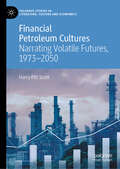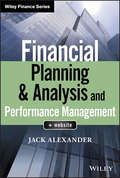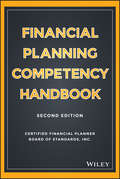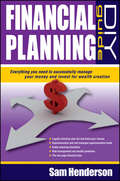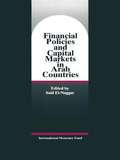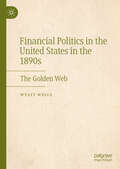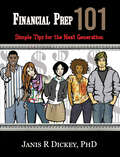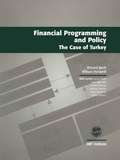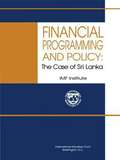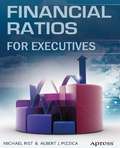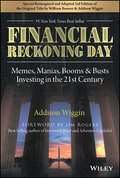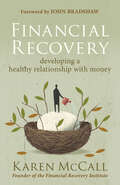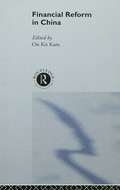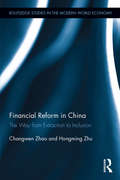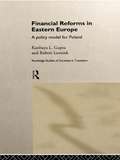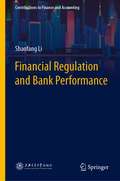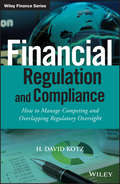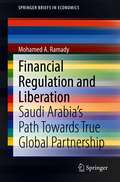- Table View
- List View
Financial Petroleum Cultures: Narrating Volatile Futures, 1973–2050 (Palgrave Studies in Literature, Culture and Economics)
by Harry Pitt ScottFinancial Petroleum Cultures draws upon literature, film, architecture, photography, infrastructure, advertisements, and financial reports to explore how financial narratives shape the future of energy and climate. Using frameworks from the energy, environmental, and economic humanities, the book argues that financial representations dominate contemporary petroleum cultures. It focuses on the competing narratives of finance, celebratory and critical, determining how energy is perceived, imagined, and used. Encompassing critiques of ideology and infrastructure, this book offers a new understanding of the political visions enabled and constrained by the financial sector in an increasingly volatile world.
Financial Planning & Analysis and Performance Management (Wiley Finance)
by Jack AlexanderCritical insights for savvy financial analysts Financial Planning & Analysis and Performance Management is the essential desk reference for CFOs, FP&A professionals, investment banking professionals, and equity research analysts. With thought-provoking discussion and refreshing perspective, this book provides insightful reference for critical areas that directly impact an organization’s effectiveness. From budgeting and forecasting, analysis, and performance management, to financial communication, metrics, and benchmarking, these insights delve into the cornerstones of business and value drivers. Dashboards, graphs, and other visual aids illustrate complex concepts and provide reference at a glance, while the author’s experience as a CFO, educator, and general manager leads to comprehensive and practical analytical techniques for real world application. Financial analysts are under constant pressure to perform at higher and higher levels within the realm of this consistently challenging function. Though areas ripe for improvement abound, true resources are scarce—until now. This book provides real-world guidance for analysts ready to: Assess performance of FP&A function and develop improvement program Improve planning and forecasting with new and provocative thinking Step up your game with leading edge analytical tools and practical solutions Plan, analyze and improve critical business and value drivers Build analytical capability and effective presentation of financial information Effectively evaluate capital investments in uncertain times The most effective analysts are those who are constantly striving for improvement, always seeking new solutions, and forever in pursuit of enlightening resources with real, useful information. Packed with examples, practical solutions, models, and novel approaches, Financial Planning & Analysis and Performance Management is an invaluable addition to the analyst’s professional library. Access to a website with many of the tools introduced are included with the purchase of the book.
Financial Planning Competency Handbook
by Cfp BoardThe official guide for exam success and career excellence Financial Planning Competency Handbook, Second Edition is the essential reference for those at any stage of certification and a one-stop resource for practitioners looking to better serve their clients. This fully updated second edition includes brand new content on connections diagrams, new case studies, and new instructional videos, and a completely new section devoted to the interdisciplinary nature of financial planning. You'll gain insights from diverse fields like psychology, behavioral finance, communication, and marriage and family therapy to help you better connect with and guide your clients, alongside the detailed financial knowledge you need to perform to the highest expectations as a financial planner. This book contains over ninety chapters that are essential for practitioners, students, and faculty. Whether a practitioner, student, or faculty member, this guide is the invaluable reference you need at your fingertips. Comprehensive, clear, and detailed, this handbook forms the foundation of the smart financial planner's library. Each jurisdiction has its own laws and regulations surrounding financial planning, but the information in this book represents the core body of knowledge the profession demands no matter where you practice. Financial Planning Competency Handbook, Second Edition guides you from student to practitioner and far beyond, with the information you need when you need it.
Financial Planning DIY Guide: Everything You Need to Successfully Manage Your Money and Invest for Wealth Creation
by Sam HendersonFinancial Planning DIY Guide is the only Australian all-in-one handbook to getting the most from your money. Written by expert financial planner Sam Henderson, this comprehensive guide will help you build and manage your assets no matter what your stage of life, and show you how to create your own one-page financial plan and put it into practice.
Financial Planning, Budgeting and Forecasting/Financial Intelligence Collection
by David A. Moss Karen Berman Joe Knight Jeremy Hope Robin Fraser Joseph H. EllisDon’t let your fear of finance get in the way of your success. This digital collection, curated by Harvard Business Review, brings together everything a manager needs to know about financial intelligence. It includes Financial Intelligence, called a “must-read” for decision makers without expertise in finance; A Concise Guide to Macroeconomics, which covers the essentials of macroeconomics and examines the core ideas of output, money, and expectations; Essentials of Finance and Budgeting, which explains everything HR professionals need to know to make wise financial decisions; Ahead of the Curve, Joseph H. Ellis’s forecasting method to help managers and investors understand and predict the economic cycles that control their businesses and financial fates; Beyond Budgeting; which offers a coherent management model that overcomes the limitations of traditional budgeting; Preparing a Budget, packed with handy tools, self-tests, and real life examples to help you hone critical skills; and HBR Guide to Finance Basics for Managers, which will give you the tools and confidence you need to master the fundamentals of finance.
Financial Policies and Capital Markets Arab Countries
by Said El-NaggarA report from the International Monetary Fund.
Financial Policy at Apple, 2013 (A)
by Mihir A. Desai Elizabeth A. MeyerBy the end of 2013, Apple had $137 billion dollars in cash and marketable securities. This case explores how companies can generate such large amounts of cash and how and if they should distribute it to shareholders, especially in the face of shareholder pressure. In the process, students are asked to undertake fundamental financial analyses, including ratio analysis, a financial forecast, and a cash distribution analysis.
Financial Policy at Apple, 2013 (B)
by Mihir A. Desai Elizabeth A. MeyerThis case is meant to accompany Financial Policy at Apple, 2013 (A) and details the results of Apple's Q2 2013 earnings call.
Financial Politics in the United States in the 1890s: The Golden Web
by Wyatt WellsIn the 1890s, the choice between the gold standard and the free coinage of silver upended American politics. The gold standard linked the United States to the larger international financial system, in which gold was the common denominator. The free coinage of silver would effectively sever these ties by devaluing the dollar. The gold standard allowed the U.S. to secure vast amounts of foreign capital on good terms to build railroads and develop industry, but at the cost of deflation. The free coinage of silver would raise prices, particularly for cotton and wheat, whose cultivators carried heavy debts and were hard-pressed. The struggle would define the United States. Would it continue to develop industrially, or would it return to its agricultural roots? The combatants—among them Grover Cleveland, William Jennings Bryan, J.P. Morgan, and William McKinley—understood what was at stake. This book deals both with well-known aspects of the contest, such as the 1896 Presidential election between McKinley and Bryan, and lesser-known ones, such as how the currency issues interacted with racial politics and international negotiations over the role of silver in the world&’s monetary system. The result is the most comprehensive account of financial politics in the United States in the 1890s yet published.
Financial Prep 101: Simple Tips for the Next Generation
by Janis R DickeyStep into the future of finance with Financial Prep 101: Simple Tips for the Next Generation.This practical workbook serves as your guide to financial freedom, demystifying the often-intimidating world of finance with straightforward explanations. Designed for both teens and adults, this easy-to-read resource brings clarity to essential financial terms and concepts that everyone should know.Navigate everyday financial choices with ease as you learn about budgeting, saving, investment strategies, financing and borrowing options, retirement planning, and safeguarding your wealth.Don&’t miss out on your pathway to financial literacy and success – your blueprint for a secure financial future starts here!
Financial Products: An Introduction Using Mathematics and Excel
by Bill DaltonFinancial Products, first published in 2008, provides a step-by-step guide to some of the most important ideas in financial mathematics. It describes and explains interest rates, discounting, arbitrage, risk neutral probabilities, forward contracts, futures, bonds, FRA and swaps. It shows how to construct both elementary and complex (Libor) zero curves. Options are described, illustrated and then priced using the Black Scholes formula and binomial trees. Finally, there is a chapter describing default probabilities, credit ratings and credit derivatives (CDS, TRS, CSO and CDO). An important feature of the book is that it explains this range of concepts and techniques in a way that can be understood by those with only a basic understanding of algebra. Many of the calculations are illustrated using Excel spreadsheets, as are some of the more complex algebraic processes. This accessible approach makes it an ideal introduction to financial products for undergraduates and those studying for professional financial qualifications.
Financial Programming and Policy
by William Hemphill Richard BarthA series of workshops introducing readers to the process of formulating a macroeconomic adjustment programme, designed to move a country toward internal and external balance. Turkey is a middle income developing country which has made great progress towards industrialisation, but not without setbacks and stabilisation problems. It therefore presents a wide range of relevant issues for study.
Financial Programming and Policy: The Case of Sri Lanka
by John KarlikA report from the International Monetary Fund.
Financial Ratios for Executives
by Rist Michael Pizzica Albert J.Financial Ratios for Executives is written specifically with today's global executive in mind. It makes financial ratios easy to understand and use effectively. This short book will prove invaluable to both financial and non-financial executives looking for easy, intuitive methods to assess corporate health and assist in strategic decision making. Financial Ratios for Executives contains over 100 financial ratios and other useful calculations. It includes ratios that are commonly used, such as return on investment (ROI), return on assets (ROA), return on equity (ROE), economic value added (EVA), and debt-to-equity ratio, just to name a few. It also includes many less-well known--yet powerful--ratios that can provide unparalleled insight into operations, financial management, sales and marketing efforts, and overall performance, among other areas. Using realistic financial and operational data from two fictional companies, the explanation of each ratio includes: Type of ratio Formula for calculating the ratioDescription of the ratioExample based on ABC Company or XYZ CompanyAdditional comments or insightsIn addition to the section on financial ratios, financial experts Michael Rist and Albert Pizzica have included a section on capital budgeting, an understanding of which is essential for both the financial and non-financial executives before they take part in an annual budget meeting or any other business meeting where capital allocation is discussed. It includes the most important tools of finance, such as net present value (NPV), internal rate of return (IRR), payback method, and total cost of ownership. Who gets ahead in the business world? Those who understand the numbers. It's as simple as that. Financial Ratios for Executives is for those who want to understand how to use financial data to support their initiatives, solve persistent problems, uncover opportunities, bolster company health, and shine in corporate meetings.
Financial Reckoning Day: Memes, Manias, Booms & Busts ... Investing In the 21st Century
by Addison Wiggin William BonnerAn engaging and practical romp through contemporary financial and economic history—and what it means for your financial future Economic booms and busts are happening with more frequency. Since the turn of the new millennium, fortunes have been made and lost at a blistering pace. Each boom is like the tension building up before an earthquake. Seismologists can detect the build-up, but they can't necessarily explain why—or when—the next quake will hit. Economic busts can be equally devastating…and followed by numerous aftershocks. In this entertaining romp through recent economic and financial history, best-selling author, Addison Wiggin, traces the primary trends that have led up to rapid economic growth and innovation while keeping an eye on the inevitable downturn. The author practices "literary economics," telling stories about the characters behind the scenes and their motives, making this wide-ranging book easy-to-read. The current edition has been revised, adapted, and re-imagined, enlightening readers about what's happening behind today's top headlines: The rise of new financial innovations over the past decade, including cryptocurrencies, mobile trading platforms, and the democratization of financial markets How the policies of the Federal Reserve following the Panic of '08 led an entire generation to become unwitting speculators in stocks, bonds, real estate, and rare commodities What impact new political trends—environmental, social, governance (ESG) and diversity equity and inclusion (DEI)—have had on managing your own money Ultimately, the book helps place current events in the context of identifiable historical trends. The book proposes that when you understand what the primary trends are and follow them to their logical conclusion, it makes planning for your financial future much easier. What will be the role of the US economy in the future as policy makers try to grapple with new competition, economic and political, from Brazil, Russia, India, China - the so-called BRICs? The author follows the facts, the trends, and the stories that make up history and parlays them into forecasts for what he sees coming next. Ultimately, you'll get a review of previous trades and a new Trade of the Decade.
Financial Recovery: Developing a Healthy Relationship with Money
by Karen McCallAfter healing her own unhealthy relationship with money, and transforming her financial disaster into prosperity and security, Karen McCall created a recovery program she has now used for more than twenty years to help individuals, couples, and businesses large and small. In the midst of her money troubles, she saw a need for something other than financial planners, accountants, and credit counselors. These experts could tell her what she should be doing differently, but she needed someone to help her understand the underlying causes of chronic, self-defeating overspending and credit card debt, underearning, and low or no savings. To save herself, she created practical, holistic tools that address these sources of pain and shame. McCall’s program supports people as they uncover their deep-seated attitudes about money; provides simple, step-by-step tools for healing areas of physical, emotional, and spiritual deprivation; and teaches skills and strategies for experiencing lasting personal and financial fulfillment even in the midst of economic challenges and reversals.
Financial Reform in China (Routledge Studies in the Growth Economies of Asia #Vol. 2)
by On Kit TamChina's spectacular economic growth has made it the focus of international attention. Financial Reform in China argues that Chinese financial reform has failed to keep pace with its continuing economic growth. With increased marketization and internationalization, China's financial and monetary system should play a pivotal role in economic reform and development. However China's banking and financial organizations still operate under a highly regulated environment shaped by the centrally planned economic system, and this slow financial reform has failed to meet the demands of more general economic reform.
Financial Reform in China: The Way from Extraction to Inclusion (Routledge Studies in the Modern World Economy)
by Changwen Zhao Hongming ZhuThis book focuses on the importance for China to correct the present imbalance in the relationship between the financial sector and the real economy. The book looks at China’s current financial system in terms of "extractive" and "inclusive". It asserts that the financial sector is producing huge "siphonic effects" that distort the overall development of the Chinese economy. Like a giant magnet, the financial sector attracts too many innovation factors, such as talents, capital and entrepreneurship away from the real economy and inhibits the development of the latter. Hence, the book argues that China’s financial system must now be thoroughly reformed to become an inclusive financial system, where finance and the rest of the economy can co-exist and develop in support of each other.
Financial Reform: What Shakes It? What Shapes It?
by Abdul Abiad Ashoka ModyFinancial sector liberalization was high on the agenda of policymakers during the last quarter of the twentieth century. But there were significant differences in the pace and scale of reform. This pamphlet examines the factors triggering-or impeding and even reversing-financial reform in 35 economies, both industrial and developing.
Financial Reforms in Eastern Europe: A Policy Model for Poland (Routledge Studies of Societies in Transition #Vol. 6)
by Kanhaya Gupta Robert LensinkThis book presents a model which simulates the effects of financial reforms in transitional economies, which is then applied to Poland for a variety of policy simulations. The authors develop models for households, commerical banks and firms, expanding their enquiry into the government sector, the central banking sector, the external sector and finally the supply side. These sub-sector models explicitly incorporate institutional features specific to the Polish economy. The estimated model is used to simulate the effects of a wide array of financial policies introduced in Poland, and these results are then used to assess the effectiveness of the policies analyzed. This timely and authoritative study sheds new light on how a country's overall economic system responds when it pursues a 'big-bang' approach to marketization.
Financial Regulation
by Faia, Ester and Hackethal, Andreas and Haliassos, Michael and Langenbucher, Katja Ester Faia Andreas Hackethal Michael Haliassos Katja LangenbucherThe 2007 to 2009 financial crisis resulted in the re-emergence of the debate on financial regulation and its relationships with other macroeconomic policies, particularly monetary policy. In Europe, the financial crisis was followed by the sovereign debt crisis, as the bail-out of the financial sector put strains on public finances in several countries. The sequence of events called for a strengthening of the union, ranging from a common framework for supervisory policy that could minimize the risk of unforeseen bank or country defaults to a common resolution mechanism that could set equal rules across countries and reduce ex-ante mis-incentives to risk-taking and moral hazard. This analysis of the state of and prospects for financial regulation examines the lending and saving behavior of banks and households as well as their borrowing activities in order to understand the conflicting priorities and complicated decisions involved in the development and implementation of financial legislation.
Financial Regulation and Bank Performance (Contributions to Finance and Accounting)
by Shaofang LiThis book focuses on the impact on financial regulation and examines the impact of financial regulation on bank performances from different perspectives. More specifically, this study investigates how bank sector reforms and bank regulation and supervision affect the competition, stability and risk-taking behavior in banking system.
Financial Regulation and Compliance
by H. David KotzDevise an organized, proactive approach to financial compliance Financial Regulation and Compliance provides detailed, step-by-step guidance for the compliance professional seeking to manage overlapping and new regulatory responsibilities. Written by David Kotz, former Inspector General of the SEC with additional guidance provided by leading experts, this book is a one-stop resource for navigating the numerous regulations that have been enacted in response to the financial crisis. You'll learn how best to defend your organization from SEC, CFTC, FINRA, and NFA Enforcement actions, how to prepare for SEC, FINRA, and NFA regulatory examinations, how to manage the increasing volume of whistleblower complaints, how to efficiently and effectively investigate these complaints, and more. Detailed discussion of the regulatory process explains how aggressive you should be in confronting federal agencies and self-regulatory organizations and describes how commenting on issues that affect your business area can be productive or not. The companion website includes a glossary of terms, regulations and government guidance, relevant case law, research databases, and FAQs about various topics, giving you a complete solution for keeping abreast of evolving compliance issues. These days, compliance professionals are faced with a myriad of often overlapping regulatory challenges. Increased aggressiveness on the part of regulators has led to increased demand on financial firms, but this book provides clear insight into navigating the changes and building a more robust compliance function. Strengthen internal compliance and governance programs Manage whistleblower programs and conduct effective investigations Understand how to minimize exposure and liability from Enforcement actions Learn how to prepare for the different types of regulatory examinations Minimize exposure from FCPA violations Understand the pros and cons of commenting on regulations The volume and pace of regulatory change is causing new and diverse pressures on compliance professionals. Navigate the choppy waters successfully with the insider guidance in Financial Regulation and Compliance.
Financial Regulation and Liberation: Saudi Arabia’s Path Towards True Global Partnership (SpringerBriefs in Economics)
by Mohamed A. RamadyThe book examines in depth, the centrality of the Saudi fixed currency regime to the US dollar, SAMA’s monetary tools, macro prudential policies and its supervision of the Saudi commercial banking sector and new sectors such as insurance, the emerging Fin Tech industry as well as a closer examination of SAMA’s investment policies as custodian of the local currency.Saudi Arabia has long been associated with its central role in the global energy market, with its decisions on production volumes affecting the global financial markets. However, the Kingdom has also emerged as a significant global financial player due to its large holdings of international currency, its dominance of the regional Gulf and Arab world capital markets, and the aspirations of its Sovereign Wealth Fund, the Public Investment Fund. The G20 Presidency in 2020 has also placed Saudi Arabia on the global stage for the country to showcase progress in many and opening up its financial market to foreign investors. But the path to financial regulation and liberation to unleash Saudi Arabia’s potential has not come overnight, but through incremental steps and learning by doing. The results speak for themselves as this book examines:• The Saudi Capital Market and the evolution of its main Tadawul and parallel NOMU stock markets following the inclusion of Tadawul in the FTSE Russell, MSCI and S&P EM Indexes• The centrality of the Saudi fixed peg exchange regime as well as a closer examination of SAMA’s investment policies as custodian of the local currency• SAMA’s rebranding in 2020 as a Central Bank, its monetary and macro prudential policies and the re entry of foreign banks to the Saudi market, reversing previous Saudization of foreign bank branches in Saudi Arabia. The Author offers an analysis of the key challenges facing Saudi Arabia in an age of financial globalization, FinTech and digitization. The challenges faced by the Saudi regulators in the COVID 19 era are examined, along with the country’s financial sector objectives as part of the Vision 2030 program, SME financing now a central plank in the country’s Vision 2030 program, the role of FDI in economic growth, the reasons behind Saudi Arabia languishing behind other countries in attracting FDI given the size of its economy and rising domestic and foreign debt levels. It has been an incredible journey for a young country, and by all indications, the journey for expanded global partnership continues as Saudi Arabia also puts into practice its version of the circular carbon economy, its commitment to climate change, and being at the forefront of a new global digital economy.
